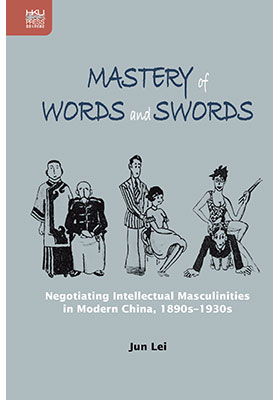Mastery of Words and Swords
Negotiating Intellectual Masculinities in Modern China, 1890s–1930s
(刀劍筆墨,運籌帷幄:重建中國近現代知識份子的男性氣質)
ISBN : 978-988-8528-74-5
Transnational Asian Masculinities 跨國亞洲男性氣質叢書
November 2021
232 pages, 6″ x 9″, 19 b&w illus.
- HK$580.00
Ebooks
Also Available on
The crisis of masculinity surfaced and converged with the crisis of the nation in the late Qing, after the doors of China were forced open by Opium Wars. The power of physical aggression increasingly overshadowed literary attainments and became a new imperative of male honor in the late Qing and early Republican China. Afflicted with anxiety and indignation about their increasingly effeminate image as perceived by Western colonial powers, Chinese intellectuals strategically distanced themselves from the old literati and reassessed their positions vis-à-vis violence. In Mastery of Words and Swords: Negotiating Intellectual Masculinities in Modern China, 1890s–1930s, Jun Lei explores the formation and evolution of modern Chinese intellectual masculinities as constituted in racial, gender, and class discourses mediated by the West and Japan. This book brings to light a new area of interest in the “Man Question” within gender studies in which women have typically been the focus. To fully reveal the evolving masculine models of a “scholar-warrior,” this book employs an innovative methodology that combines theoretical vigor, archival research, and analysis of literary texts and visuals. Situating the changing inter- and intra-gender relations in modern Chinese history and Chinese literary and cultural modernism, the book engages critically with male subjectivity in relation to other pivotal issues such as semi-coloniality, psychoanalysis, modern love, feminism, and urbanization.
“Jun Lei’s brilliant book offers a wealth of information and insights on how intellectuals such as Liang Qichao and Lu Xun shaped notions of Chinese masculinity in the tumultuous late Qing and May Fourth periods. Its account of how China’s interactions with the West and Japan impacted ideas of masculinity in modern times is compelling reading.” —Kam Louie, author of Theorising Chinese Masculinity: Society and Gender in China and Chinese Masculinities in a Globalizing World
“What are political and cultural consequences when a Chinese man looks and behaves like a woman? Jun Lei probes the psychic, intellectual, and nationalist underpinnings of that question. This provocative book offers an engaging story and insightful analyses about how male writers grappled with the effeminate look and strove to revitalize manliness.” —Ban Wang, Stanford University; author of China in the World: Culture, Politics, and World Vision







